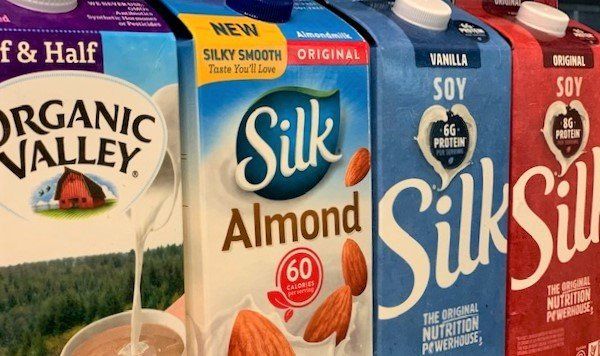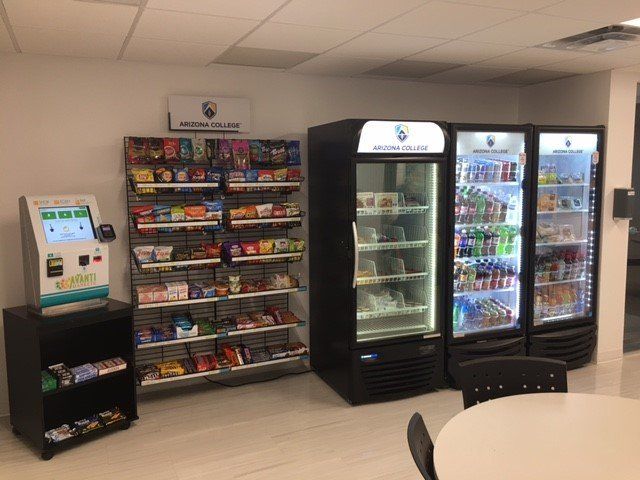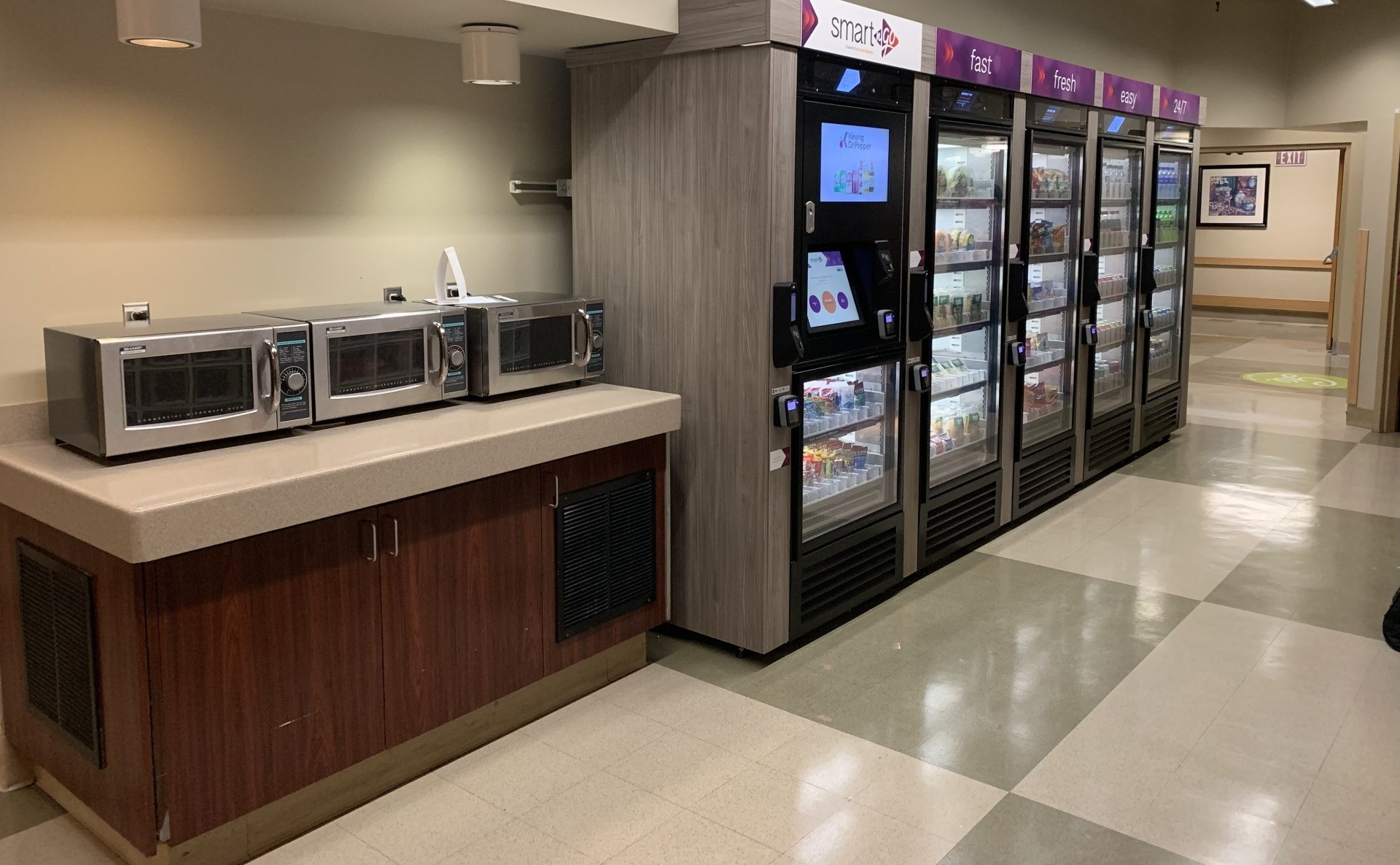Office Coffee Trends – Creamer Options Expand
Arthur Siller, VP of Operations for Evergreen Refreshments, recently spoke with VendingMarketWatch about how Operators with OCS accounts need to stay on top of the latest creamer trends to best service their clients.
This blog post features excerpts from an article previously published on VendingMarketWatch.com titled, “How Do You Take Your Coffee” about trends in office coffee service and creamers. Click here to read the full article on VendingMarketWatch.com.

WHAT ARE THE TRENDS IN COFFEE CREAMER?
Consumers are increasingly personalizing their coffee, and suppliers have responded.
The variety of plant-based options — soy, almond, oat, etc. — continues to expand. Arthur Siller, vice president of operations and business development at Avanti Markets Northwest, noted that businesses want to keep their employees happy, especially when unemployment is low. Providing employees with a variety of flavor options is one way that employers can show they are taking care of their valued staff.
“For our clients, keeping talent and gaining new talent has become very important”
“For our clients, keeping talent and gaining new talent has become very important,” Siller said. So, we’ve seen, especially on the West Coast, a pretty dramatic shift to where just traditional creamers is not enough. They don’t want just milk, they want unsweetened almond milk, oat milk, rice milk, and three types of soy milk. These options have become increasingly important for our clients, which means they’re important for us.”
“These options have become increasingly important for our clients, which means they’re important for us.”
WHAT ABOUT OCS AT SMALLER COMPANIES?
Siller said that even smaller and midsize companies — those with 40 to 100 employees, for example — might carry eight different milk options to cater to the individual needs of their staff.
“They’ve got to have almond, unsweetened almond, vanilla soy, unsweetened soy, rice milk, 2 percent milk, 1 percent milk, fat-free milk. They may also ask for their dairy to be organic, or from a local source. Especially in the Northwest, our clients are increasingly interested in supporting companies and brands from their own city.”
SUPPORTING LOCAL
In addition to supporting local businesses, consumers like to know what’s in the products they’re consuming every day. Natural and organic products with minimal ingredients or additives are very popular. This is especially true with millennials and people who have dietary restrictions or allergies.
“The other piece that’s driving this trend, particularly with millennials, is the increase in health-consciousness, and knowing exactly what’s in the products you’re consuming,” Siller said. “People want ingredient lists that are short, not long, and they want products that are simple.”
WHAT’S THE MOST POPULAR CREAMER OPTION?
Siller said that while French Vanilla is “far and away the leader” in flavors, the healthy, better-for-you trend is impacting this longstanding favorite.
“For a long time, vanilla and then hazelnut creamers were the standard, but now unsweetened is a must.”
“Unsweetened has become increasingly popular among non-dairy products,” he said. “For a long time, vanilla and then hazelnut creamers were the standard, but now unsweetened is a must. While every region is different, we certainly see this as trend to provide options without sugar.”
Siller pointed out that sugar-conscious consumers have been driving this trend for years, but instead of opting for chemically-based sugar alternatives, people are now gravitating towards natural and organic options like raw sugar, honey, stevia and agave.
WHAT’S NEXT IN OFFICE COFFEE SERVICE TRENDS?
The rising popularity of natural sweeteners and non-dairy milks and creamers doesn’t necessarily mean that traditional products aren’t still popular in OCS.
What it really comes down to — and this is true of every segment in our industry — is that our clients want to offer more choices. They don’t want to just limit it to healthy; they want to please everybody. Our clients want to have more options, not less.
That being said, Siller said this may not be the case in 10 years, especially as baby boomers continue to retire and a larger number of millennials and Gen Z enters the workforce.
“Traditional products will continue to lead, but the alternatives may start to take over,” Siller predicted. “For now, they want all the options, but I see a day probably not too far from now where they may say, ‘We just want to have dairy, dairy alternatives, and natural sweeteners in the office.’
Having a large variety of non-dairy options is more expensive, and that not every company is willing to spend that much on OCS, nor does their workforce demand it.
HOW CAN AN OPERATOR BE SUCCESSFUL IN OCS?
Siller said that operators can address the growing desire for greater variety in OCS by being proactive. Operators should take a consultative approach with clients.
“Don’t wait for the day to come where that large, potential new piece of business is making these requests and you’re not prepared.”
“Like anything, I would say to get ahead of it so you maintain control,” he said. “With our sales approach, we try to guide the conversation. If you want to be successful in having more dairy and dairy alternatives, lead that conversation with your client. Don’t wait for the day to come where that large, potential new piece of business is making these requests and you’re not prepared. Instead, you can be the expert and say, ‘Here are 10 dairy alternatives we currently carry, and here’s what makes sense from a cost standpoint.’ They’re a lot more willing to follow you in that conversation.”
Operators may find that they need to carry more products to satisfy the needs of their OCS clients. But it’s worth the extra effort.
“We’re carrying a lot more SKUs of OCS products than we did in the past,” he said. “It presents an interesting challenge for us, having to source all these different products, but the flip-side of that is we’re also winning new business, retaining business, and keeping happier clients.”
Office coffee trends may continue to shift, but staying on top of these trends can lead to growth and success in the OCS space.

Even before COVID-19 changed the restaurant and retail landscape in 2020, micro markets were growing at a nearly unprecedented rate due to: increasing consumer demand micro market operator earning potential versatility of micro market options underserved markets which represent opportunity for entrepreneurs ever-evolving micro market technology and capabilities Micro market revenues grew nearly $1B between 2016-2019, climbing to a record high $26B in revenues in only two years. We believe there has never been a more exciting time to become a micro market operator , and here are five reasons why, including the benefits of partnering with Avanti Markets on your micro market business. 5 Reasons to Open an Avanti Micro Market Business Right Now 1. Consumer Demand and Preferences The growth of micro markets is not just about the consumer’s demand for food and beverages. Micro markets answer consumer preferences in many areas, especially now in the aftermath of COVID-19 and its impacts to food service. Micro markets answer the consumer’s growing demand for convenience, self-service, and touchless payments, especially among younger consumers (and a younger workforce). Micro market technology enables unattended retail as a food service solution that can be placed in nearly any setting, such as: Office buildings, lobbies, and corporate campuses Colleges, universities, high schools, and other educational institutions Hospitals, medical buildings, medical office parks, etc. Airports, train stations, bus stations, and other commuter facilities Hotels and motels Adjacent to (or in place of) traditional cafeterias Resorts, arenas, stadiums, convention centers, entertainment venues Neighborhood convenience retail locations Automobile service and sales facilities Today’s COVID-19 era consumer also demands food safety and security. Micro markets offer safer, smarter vending solutions where foods and beverages are safely stored, minimally handled, and where inventory can be managed in real time to avoid shortages and respond to demand. The size and type of items which could be dispensed by traditional vending machines limited their ability to satisfy the needs of consumers who are increasingly aware of the benefits of eating healthy. Micro markets and intelligent vending solutions are not constrained in the same way, and so they are able to deliver access to the healthy, fresh foods that consumers want from food service solutions in retail and employment settings.

PART 4 OF A SERIES CONTACTLESS OPTIONS FOR THE WORKPLACE - OFFICE COFFEE INCLUDED Contactless shopping is a term we are all hearing a lot lately. It’s one of the strategies being enacted to keep people safe given the impact of the COVID-19 pandemic. But what could that mean for the workplace breakroom? The good news is that companies do have options to help keep their employees safe with contactless options while maintaining office perks such as coffee service or breakroom food options. With the new normal of minimized shared contact points in our everyday lives, the office coffee pot has come under scrutiny. Self-serve pours from the same containers used by virtually all employees no longer feels safe. To combat this, fully contactless coffee solutions are being introduced to the office coffee service landscape. Many convenience service operators are offering coffee programs that limit shared touchpoints to align with consumer expectations. One such example is a bean-to-cup brewer with a software add-on that allows for contactless beverage selection. Users can scan the 2D code on their smartphone and be taken to a mobile interface to make their drink selections. Once selection is completed, the coffee machine will dispense the coffee or hot beverage to the user’s specifications. Companies can use this system to continue to offer free coffee for employees. Or, if they want employees to pay or want to subsidize the cost, the payment can be completed through an associated micro market kiosk. The benefit of a bean-to-cup brewer is that employees can get a fresh, customized cup of coffee at a fraction of the cost of going to the local coffee shop. Not to mention, this way, employees are staying on site to get their coffee instead of traveling to an outside establishment. These are important benefits related to morale and safety of workers. As mentioned, a contactless coffee system can be used in conjunction with a micro market kiosk. An Avanti micro market in your breakroom is another contactless perk not to be overlooked for your facility. Fresh food micro markets offer a variety of fresh, healthy, and in-demand food and beverage items that are likely to keep employees on site for lunch instead of going out to pick up food from a different location.

Micro markets are on the grow nationwide. The revenues generated by micro markets increased 99 percent between 2016 and 2018, representing more than $2B in annual sales. While they initially found success in manufacturing businesses and office buildings, micro markets and smart vending solutions have the potential to grow exponentially in other industries as well.

Smart N Go Markets give hospitals and medical facilities a reliable and secure food service solution that is available 24/7. Smart N Go markets are a revolutionary self-service food service alternative that is ideally suited to better serve the needs of hospitals and medical facilities beyond open cafeteria or traditional snack vending. Available at little or no cost to your facility, Smart N Go intelligent vending allows a variety of fresh food, beverages, snacks, coffee and more to be ready to grab 24/7 behind secured glass doors.

7 Benefits of Micro Markets in Light of COVID-19 Prior to the COVID-19 pandemic, micro markets were an emerging trend. These unattended retail establishments began cropping up in offices and apartment building lobbies since 2010 and are especially popular with Millennials and Generation Z. During the pandemic micro markets have evolved from fun novelty conveniences into essential businesses that provide key benefits to the general public and businesses, including the healthcare industry. Here are seven benefits micro markets offer during the COVID-19 pandemic and beyond: 1. No-contact, touch-free transactions 2. Safety and security 3. Provide safe and healthy food options 4. Entice employees back to the office 5. Not affected by labor shortages 6. Versatility and convenience 7. Opportunities to serve underserved markets 1. No-contact, Touch-free Transactions Micro markets are unattended retail spaces and even prior to the advent of the COVID-19 pandemic, they provided customers with a contactless way to purchase healthy food and beverages. Furthermore, micro markets provide added safety in that they offer consumers touchless payment options that can include things like subscription options and payments via an app they can easily download to their smartphone. 2. Safety and Security Micro markets provide the COVID-19 era customer with the added security and food safety they demand. Even fresh produce can be pre-packaged, providing consumers with the added confidence that a piece of fruit, such as an orange or an apple, hasn’t been handled by other people. And for added security, sneeze guards and other plexiglass display options can be installed as well. Additionally, the food and drinks at micro markets have always been safely stored and offered in an easy to access self-service environment where it’s easy for customers to stay socially distanced from each other for added peace of mind. 3. Provide safe and healthy food options According to a recent survey of nearly 1,500 adults, 56 percent of the respondents admitted they found it challenging to eat healthy, in spite of 89 percent also saying that nutrition is important to them. And because micro markets aren’t vending machines but mini one-stop shops, they can provide your customers or employees with healthy snack options in conveniently wrapped and sealed packaging. Furthermore, larger items like sandwiches, salads and fresh produce aren’t a size issue like they are for vending machines that are more limited to less healthy options such as candy or chips.





